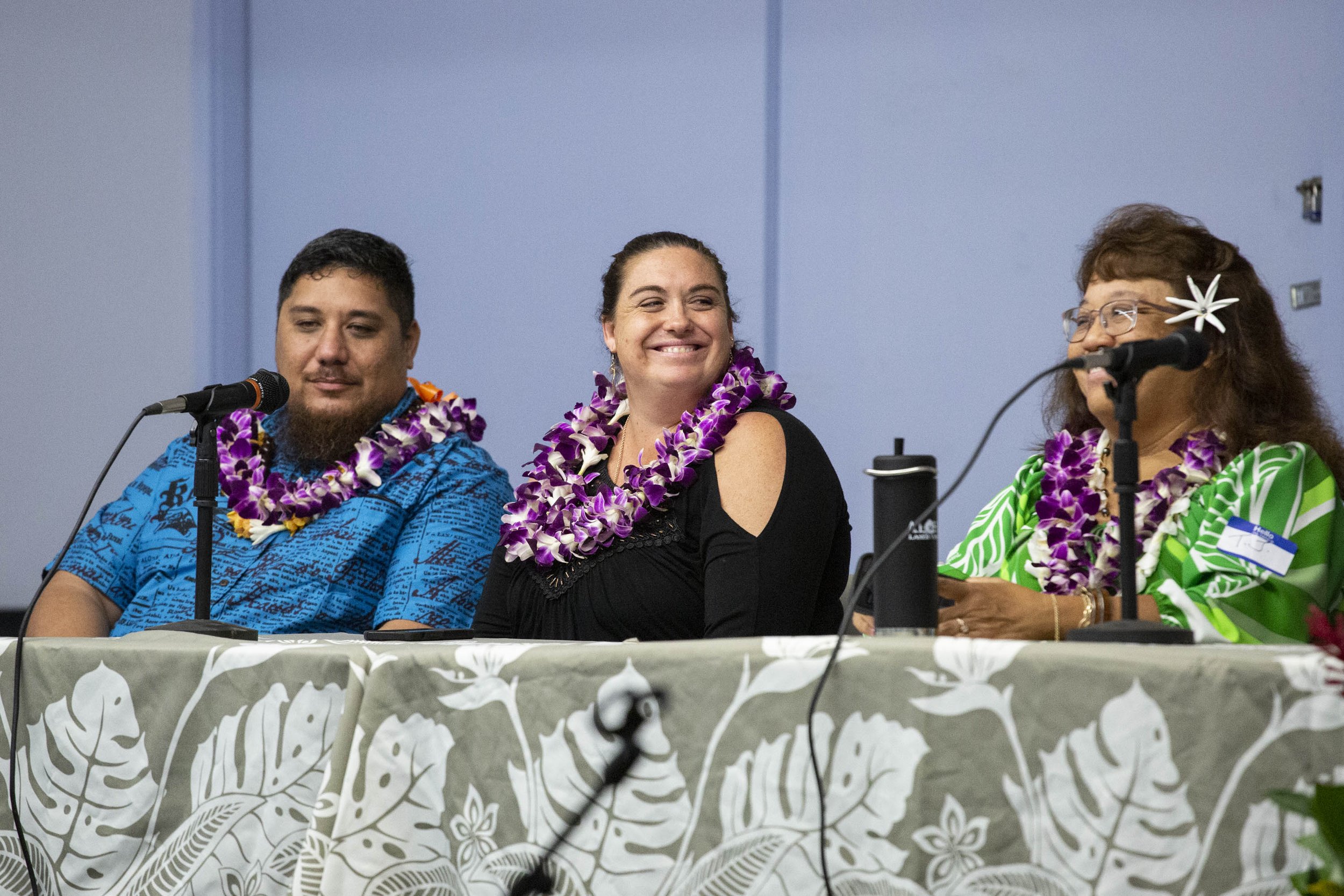How it Went: Into the Weeds Film Screening
Nui mahalo to the team at Re:Wild Your Campus!
The film Screening of Into the Weeds reminds us of the personal stakes and the extent that corporations will go to in order to evade the consequences and destructive realities of their chemical products.
Those of you that have followed our journey, youʻll remember our 2019 partnership with Re: Wild Your Campus (formerly Herbicide Free Campus) and the other members of Protect Our Keiki Coalition, to host Dwayne “Lee” Johnson on a speaking tour through Hawaiʻi in order to share his moʻolelo (story) with his health battle from severe exposure to Range Up (the industrial version of Round-Up) and his legal battle with Monsanto/ Bayer, agri-chemical corporate titan. Lee Johnson, a former groundskeeper, is the first plaintiff to successfully sue Bayer/Monsanto for causing his non-Hodgkins lymphoma.
As a result of his state-wide speaking tour and Lee Johnsonʻs sharing more on glyphosate-based herbicides' health and environmental impacts while offering non-toxic alternatives, the Hawaiʻi Department of Education (DOE) bans the use of herbicides on school campuses
As a follow-up, again, Re:Wild Your Campus teamed up with the Protect Our Keiki Coalition to bring the documentary of Johnson's story, "Into the Weeds” to Oʻahu audiences. The screening coincided with the 2023 Legislative Sessions and HAPAʻs milestone community engagement series, which is presenting the first reports (2019) of restricted-use-pesticides (RUP)— these presentations are a milestone after over a decade of grassroots campaigning for codified protections against pesticides.
Left to right: Kūʻike Kamakea-Ohelo, Fern Anuenue Holland, Thora-Jean Cuaresma. Photo Credit: Marie Hobro, HAPA
Flyer to the screening on the bulletin at the screenings venue: Church of the Cross-roads. Photo Credit: Marie Hobro, HAPA
Cuaresma opened up about her uncleʻs health struggles— with eerie parallels to Lee Johnsonʻs struggles in Into the Weeds.
After the screening Mackenzie Feldman, co-founder of Re:Wild Your Campus moderated a panel on the present state of pesticides in Hawaiʻi. Panelists included: HAPA Kauaʻi Organizer, Fern Holland; HAPA Oʻahu Organizer TJ Cuaresma; and Kūʻike Kamakea-Ohelo, Aloha ʻĀina activist and farmer who currently sits on the Land Use Commission.
Cuaresma is Kānaka Maoli and has been a lifelong resident of the rural, agricultural community on the North Shore of Oʻahu. She formerly managed the community engagement for House Rep. Amy Perussoʻs office; she has been working with HAPA to organize community meetings in the communities on Oʻahu exposed to concerning amounts of pesticides. She insisted that stories like Lee Johnsonʻs exist here in our islands, she shares how"this is [her] uncle, Lee Johnson is my Uncle." Cuaresma opened up about her uncleʻs health struggles— with eerie parallels to Lee Johnsonʻs struggles in Into the Weeds.
Holland, born and raised on Kauaʻi, had joined the movement to regulate pesticides when her friends on Kauaʻi began getting sick, and alarming rates of birth defects in their communities. Holland opened up during her 15 years of organizing, she had repeatedly confronted the evasive tactics and political retaliation of agri-chemical companies in Hawaiʻi; the frustration she felt in attempting year after year to pass “common sense” legislation but to be out-resourced and out-powered by corporate lobbyists. Despite the heaviness and moments of defeat, she conceded “what choice do (we) have but to keep fighting? This is my lifeʻs work.”
Kamakea-Ohelo is Kānaka Maoli and comes from a prominent activist ʻohana; he was raised on the east-side of Oʻahu in Waimanalo. He recently joined the Statesʻs Land-Use Commission (LUC) and his presence there represents a shift from the typical members and expertise that has dominated the LUC in the past decades. Kamakea-Ohelo spoke to very real and effective alternatives in natural farming methods, despite narratives to the contrary; these real, natural, and viable methods not only would provide food, but help regenerate Hawaiʻiʻs soils after over a hundred years of monocropping and chemical dousing— first, it would require reforming how agricultural lands are managed and what kinds of safety nets and securities could be provided to small, local food producing farmers.
Post-screening panel contextualized realities of the film for her in Hawaiʻi. Photo Credit: Marie Hobro, HAPA
Lee Johnson on screen talks about the impacts to his health his extreme exposure brought on. Photo credit: Marie Hobro.
Ultimately, the message of the panel is that the road to progress is long and slow, and yet it is the fastest path to change.
We need to remember the Davids (and Lee Johnonʻs) that take on and take down Goliaths.
Here are some next steps (action)!
Subscribe & testify: legislative alerts & add your voice in support.
You can view HAPAʻs legislative priorities here; we will have an update on the bills later this week.
Get involved: reach out to an organizer and volunteer
if youʻd like to volunteer in some capacity. We need people to help us get the word out, organize presentations, and coordinate testifiers. You can reach Fern Anuenue Holland or TJ Cuaresma at info@hapahi.org— our administrator will help identify with the best way to plug you in.
Support our work: donate to Hawaiʻi Alliance for Progressive Action
so that we can continue to analyze pesticide data and engage the community with the data.
www.hapahi.org | info@hapahi.org | (808) 212-9616 | P.O. Box 1534, Kapaʻa, Hawaiʻi 96746
The Hawaiʻi Alliance for Progressive Action (HAPA) is a public non-profit organization under Section 501(c)(3) of the Internal Revenue Code. HAPA’s mission is to catalyze community empowerment and systemic change towards valuing ʻāina (environment) and people ahead of corporate profit.




